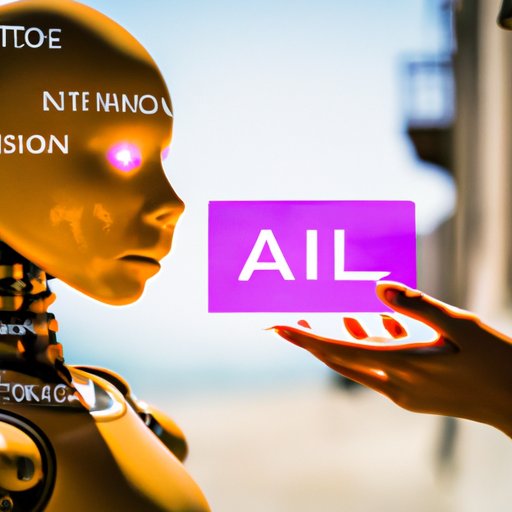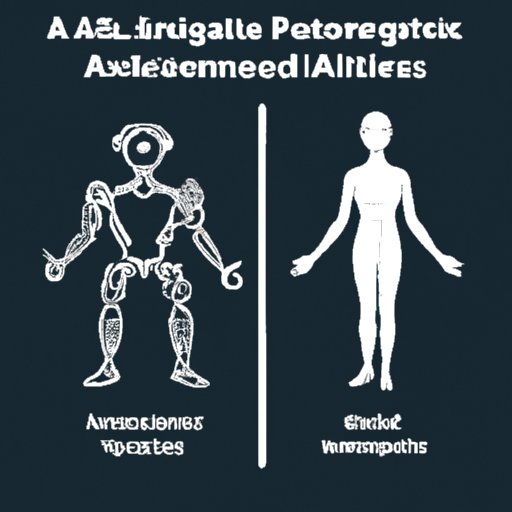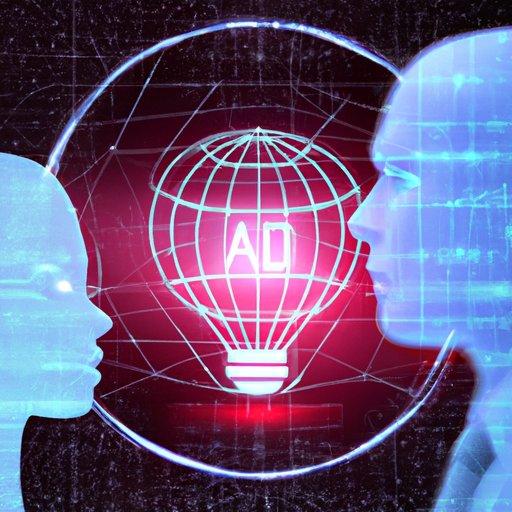Introduction
Artificial intelligence (AI) has become an increasingly important part of modern life. From self-driving cars to smart home assistants, AI is changing the way people interact with technology. But what does this mean for society? Is AI a good thing or a bad thing? In this article, we will explore the pros and cons of AI in society and examine its potential impact on human life.
Exploring the Pros of AI in Society
There are many potential benefits of AI in society. From increased efficiency to improved quality of life, here are some of the ways AI can be beneficial to society:
Increased Efficiency
AI has the potential to increase efficiency in a variety of industries, from manufacturing to healthcare. By automating mundane tasks, AI can free up time for humans to focus on more complex tasks. According to a study by McKinsey Global Institute, “the application of AI technologies could potentially create economic value of $13 trillion by 2030.”
Improved Quality of Life
AI can also improve the quality of life for people in many different ways. For example, AI-powered chatbots can provide customer service 24/7, allowing customers to get help whenever they need it. AI can also be used to monitor the environment and detect pollution, allowing for better air quality.
Reduced Cost of Living
AI can reduce the cost of living for individuals and businesses alike. Automated systems can reduce the need for manual labor, resulting in lower labor costs. AI can also make it easier to find cheaper goods and services, as well as reduce energy costs by optimizing usage.
Increased Accessibility
AI can also make everyday tasks more accessible for those with disabilities or limited mobility. AI-powered voice assistants can help those with visual impairments access information. AI-powered robots can also help those with physical disabilities perform everyday tasks.

Examining the Cons of AI in Society
While there are many potential benefits of AI in society, there are also some potential drawbacks. Here are some of the potential cons of AI in society:
Societal Disruption
One of the biggest potential drawbacks of AI is that it could lead to disruption in society. As AI takes over manual labor jobs, it could lead to massive unemployment and social unrest. According to a report by the International Labour Organization, “up to 25 million jobs could be displaced by automation by 2030.”
Loss of Jobs
Another potential con of AI is that it could lead to the loss of jobs. As AI takes over manual labor jobs, it could lead to massive unemployment and displacement of workers. This could have a negative effect on the economy, as fewer people would be employed and able to contribute to the workforce.
Privacy Concerns
AI also poses potential privacy concerns. With the rise of AI-powered facial recognition technology, it is becoming easier for companies and governments to track and monitor people without their knowledge or consent. This could lead to an erosion of privacy rights and an increase in surveillance.
Security Risks
Finally, AI poses potential security risks. As AI becomes more advanced, it could be used to launch cyberattacks or manipulate data. This could lead to data breaches, identity theft, and other security issues.
Examining the Impact of AI on Human Life
AI has the potential to have both positive and negative impacts on human life. Here are some of the potential impacts of AI on human life:
Impact on Employment
AI has the potential to drastically change the job market. On one hand, AI could create new jobs, such as AI engineers and data scientists. On the other hand, AI could replace manual labor jobs, leading to massive unemployment and displacement of workers.
Impact on Education
AI could also have an impact on education. AI-powered virtual tutors could provide personalized instruction for students and help them learn at their own pace. However, AI could also lead to increased standardization of education, which could limit creativity and critical thinking.
Impact on Healthcare
AI could also have an impact on healthcare. AI-powered medical diagnostics could provide more accurate diagnoses and treatments. However, AI could also lead to increased costs, as hospitals and clinics invest in AI-powered technology.
Evaluating the Benefits and Risks of AI to Society
As with any technology, there are both potential benefits and risks of AI to society. Here are some of the potential positives and negatives of AI:
Positive Effects
AI has the potential to increase efficiency, reduce costs, improve quality of life, and increase accessibility. AI could also create new jobs and open up new opportunities for people.
Negative Effects
AI also poses potential risks to society, such as societal disruption, loss of jobs, privacy concerns, and security risks. AI could also lead to increased surveillance and decreased privacy rights.

Assessing the Positive and Negative Effects of AI on Our Lives
AI has the potential to both positively and negatively impact our lives. Here are some of the potential benefits and dangers of AI on our lives:
Potential Benefits
AI could make everyday tasks easier, such as shopping, banking, and transportation. AI could also improve healthcare, education, and employment opportunities.
Potential Dangers
AI could also pose potential dangers, such as increased surveillance, security risks, and privacy concerns. AI could also lead to the displacement of workers and social unrest.

Investigating the Potential Benefits and Dangers of AI to Humanity
Ultimately, AI has the potential to both benefit and harm humanity. Here are some of the potential benefits and risks of AI to humanity:
Benefits
AI could lead to increased efficiency, reduced costs, improved quality of life, and increased accessibility. AI could also create new jobs and open up new opportunities for people.
Risks
At the same time, AI could lead to societal disruption, loss of jobs, increased surveillance, and security risks. AI could also lead to decreased privacy rights and increased inequality.
Conclusion
In conclusion, AI has the potential to both benefit and harm society. There are potential benefits, such as increased efficiency, improved quality of life, and increased accessibility. At the same time, there are potential risks, such as societal disruption, loss of jobs, privacy concerns, and security risks. Ultimately, it is important to weigh the potential benefits and risks of AI before implementing it in society.
Summary of Findings
This article explored the pros and cons of AI in society and examined its potential impact on human life. It assessed the potential benefits and risks of AI to humanity, and investigated the potential benefits and dangers of AI to our lives. It was found that AI has the potential to both benefit and harm society, and that it is important to weigh the potential benefits and risks before implementing it in society.
Final Thoughts
As AI continues to develop and become more ubiquitous, it is important to consider the implications it may have on society. We must weigh the potential benefits and risks of AI before implementing it in our lives. Only then can we ensure that AI is used responsibly and for the benefit of all.
(Note: Is this article not meeting your expectations? Do you have knowledge or insights to share? Unlock new opportunities and expand your reach by joining our authors team. Click Registration to join us and share your expertise with our readers.)
